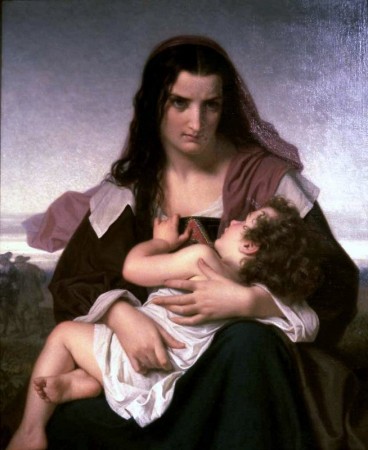 It is truly mindboggling how the life of Jesus, a man conceived out of wedlock by a woman who made up her own mind to get pregnant without consulting her father, her mother, her rabbi or her fiancé, has been twisted by a shame-inducing mega-corporation, the Roman Church, run by judgmental and merciless men.
It is truly mindboggling how the life of Jesus, a man conceived out of wedlock by a woman who made up her own mind to get pregnant without consulting her father, her mother, her rabbi or her fiancé, has been twisted by a shame-inducing mega-corporation, the Roman Church, run by judgmental and merciless men.
Christian sexual shaming, marketed in God’s name, flies in the face of Jesus’ storied actions in defense of prostitutes and his public reputation for socializing with them, women who, in any society, have a real need to be able to choose abortions in order to survive their difficult and dangerous lives.
There stood Jesus, who stepped into the circle of men who were stoning a woman for adultery, and challenged them to name themselves sinless. And here stand the prelates of the Church that bears his name, casting stones against women who choose abortions, with crocodile tears streaming down their cheeks as they mutter, The poor child!
As if it were a Christian teaching that God has pre-designed each life from the moment of conception, and women are interfering with God when they take charge of their own reproduction. There is no such biblical teaching, and please do not proof-text phrases about God’s knowing us before we were born as if those overcame the Law, the Prophets, and the mercy of Jesus Christ.
Neither mercy nor the Law, nor the loving exhortation of the prophets would be needed in this world, were our lives planned out in advance by God. And the Bible begins with the long tale of Adam and Eve choosing knowledge and freedom over a programmed life in Eden.
Cursed is the perspective Rome uses for interpreting this tale of departure from Eden, which leads them to real-world lives with both pain and hard work in them. Yet the older, Orthodox theology understands this tale as a story of growing into adulthood, and the eating of the apple as an elevation of Adam and Eve.
Mary, the woman whom the Roman Church considers the antidote to Eve, chooses to challenge customary morality, her family, church and her fiancé Joseph, with a pregnancy she herself proclaims is dedicated to toppling the mighty from their thrones and scattering the proud in their smug imaginations.
Jesus never speaks against abortion, though he clearly knew a lot about the women who needed it, and let’s not fool ourselves into thinking that abortion is something new in this world.
The Ten Commandments, which specify the greatest of human sins, do not mention abortion either. In fact, the only sexual sin mentioned in the Commandments is adultery– in our times, the sexual sin most easily looked upon with mercy and forgiveness. And Jesus, who urged that mercy upon us all, would approve. Yet he would weep at the intransigent refusal of so many to allow women he loved and respected to have the right to choose when to bear children. And when not.
Women are not slaves. Women’s wombs are not subjugated when pregnant, and women are not slaves to the fetus within them. This intensely personal decision, to bear a child, is upheld in many a biblical story in which the father would have loved to have aborted the fetus but the woman would not.
Think of David, when Bathsheba conceived before their marriage. Or Tamar, who seduced the patriarch Judah and publicly declared him the father of her child. She is a foremother of Jesus, according to Matthew. And Judah, who never married her, acknowledged her right to be pregnant in a situation where he could have had her stoned to death.
Sex is a healthy part of adult lives. And the boundaries within which men and women have any kind of sex are theirs to determine, to maintain, to rejoice in, to regret, to atone for, to adjust to, to learn from, and to transform.
This is biblical teaching about all our lives. And our sexual lives are not excluded from this teaching, nor given to others to control. Our long walk through the wilderness of desire is not a path in which conformity of behavior makes us faithful. As with all our longing and our weeping, desire is the place where we will find God present, embracing us, forgiving us, rejoicing in us, helping us to go on. This week’s reading, the story of the Prodigal Son, teaches us this, as does the whole of the gospels.
The film Spotlight, chosen Best Film this year, surely teaches us the wrong that we do to women and to men when we stifle their sexual lives, and the need that women have to be able to choose from a complete range of reproductive options, including, the necessary mercy, at significant times, of choosing an abortion, without having to justify their decision to anyone except the Holy Spirit.
Women bear children – and choose abortions – with Jesus’ blessing.
_________________________________________________________________
Images:
1. Woman Caught in Adultery, by He Qi. Nanjing, China. 2001. Vanderbilt Divinity School Library, Art in the Christian Tradition.
2. The Scarlet Letter, by Merle Hugues. 1861. Walters Art Museum, Baltimore, MD. Vanderbilt Divinity School Library, Art in the Christian Tradition.










